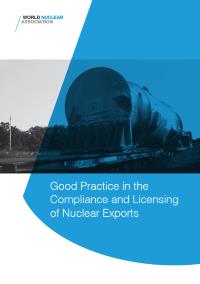Good Practice in the Compliance and Licensing of Nuclear Exports
Nuclear energy is making a growing contribution to a reconfigured low-carbon electricity supply system around the world. Trade in nuclear fuel, reactor systems and components has the potential to reach $40 billion a year, but despite the removal of many technical barriers to trade in other strategic sectors, governments continue to impose strict controls on nuclear exports.
In this report, the World Nuclear Association maps the strategic export control landscape and identifies examples of good practice by suppliers and export control authorities. We propose a number of measures for streamlining licensing and for improving communication with the industry.
Export controls aim to preclude states and unauthorized entities from acquiring materials, equipment and technology that could be used to make a nuclear or radiological weapon. The world nuclear industry contributes to countering this threat through robust internal compliance programs at company level to ensure that transactions do not involve suspect parties. Export control authorities should be able to recognize good practice by extending authorized (or trusted) economic operator status to companies that apply diligently a robust and comprehensive internal compliance program to their operations.
Most export control authorities do not issue general export licences for nuclear-related items, even though they do issue such licences for certain nonnuclear dual-use items, which places the nuclear industry at a disadvantage in comparison with the aerospace and defence industries.
The degree of scrutiny accorded to nuclear technology should be risk-based. A nuclear power reactor poses a relatively low technology risk with respect to proliferation. The same is true for components, spare parts, and maintenance or repair services for an existing nuclear facility that is subject to international safeguards. Under a risk-based approach the export of components and complete power reactors should be made possible under general authorization, without a prior individual licence, to another country that is a participating state in the Nuclear Suppliers Group (NSG), subject to notification being provided to the national authorities of the exporting and importing countries concerned. Within free trade areas, like the European Union’s single market, shipments should be notifiable but otherwise unrestricted.
Nuclear fuel assemblies are composed of fissile material and therefore pose a greater proliferation risk than a nuclear reactor itself (which cannot operate without fuel). However, as nuclear fuel is normally made of low-enriched uranium it should not be subject to a requirement for licence approval prior to shipment between NSG participating states, as they have accepted International Atomic Energy Agency (IAEA) monitoring. There should be general authorization for low-enriched fuel exports with a simple reporting requirement to the strategic goods control authorities of the countries involved in the shipments.
Enrichment and reprocessing technologies are associated with a higher proliferation risk and there is thus greater justification for licensing each transaction through an individual application for export. Resources can be better employed if exporters and governments made greater use of risk assessment. Destinations of concern could be checked out (‘red 2 flagged’), while those that are already under international safeguards would be accepted as eligible to be fast-tracked.
The trade and investment agreements between the EU and Canada and the EU and the USA, which is being negotiated currently, offer a mechanism to address the technical barriers to trade in the nuclear sector in future. The same considerations could apply once the Trans-Pacific Partnership comes into force.
The NSG should do more to exchange information and engage with the industry. A forum for industry-regulator cooperation in the export control and counter-proliferation area involving the relevant inter-governmental organizations including the IAEA, NSG, Wassenaar Arrangement and the UN Office for Disarmament Affairs would be useful. An industry-driven road map for streamlining the international export control regime endorsed by the relevant inter-governmental organizations would make an excellent starting point.
The World Nuclear Association is ready to collaborate in building an effective and efficient export control regime, based on improved communication and a more internationally consistent approach.
